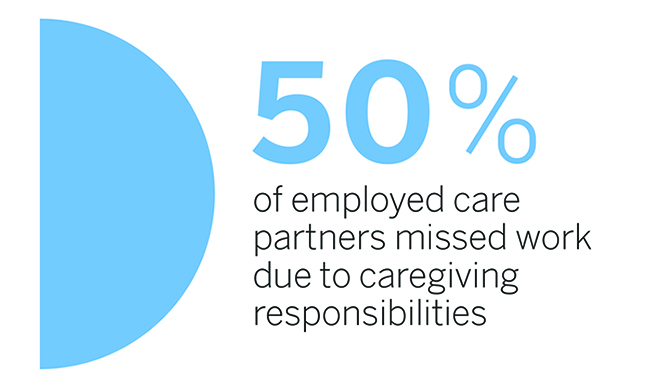Contact Information
Hassam Ansari
Communications Officer, BrainsCAN
Western University
hassam.ansari@uwo.ca
Supporting care partners and those with dementia in the workplace
January 21, 2020 - BrainsCAN Communications

Imagine spending your career mastering your craft when suddenly, you begin to struggle with tasks that have always seemed simple. Dementia is a difficult diagnosis, but for those diagnosed while still working, it can be even more complicated.
While the majority of dementia diagnoses take place after someone has retired, there are a number of people diagnosed at an age where they’re still working. According to the Alzheimer Society of Ontario, 16,000 Canadians under the age of 65 are living with young onset dementia. Oftentimes, it’s changes in work performance that signal an issue and lead to a dementia diagnosis.
Susan was working as a human resources professional when she started having difficulty.
“In her career, she was a very well respected HR professional. She gradually went on to helping with general office duties, but then had trouble completing day-to-day tasks in an office environment,” said Tony, her husband and care partner. “In hindsight now, things were starting to go wrong years before the dementia diagnosis was made.”
Care partners to those with dementia also face difficulties when it comes to balancing their work and caregiving responsibilities.
“I tried some part time work this past year, but the demands as a care partner were so great that I had to resign from my job,” added Tony.
A recent BrainsCAN survey of over 500 Alzheimer Society clients in southwestern Ontario found that 50% of employed care partners missed work due to caregiving responsibilities. These responsibilities included anything from doctor’s appointments, handling unexpected crisis situations, to taking days off work to provide extra support to the person with dementia. Of the employed care partners who missed work, an average of 10 days were missed.

One of the biggest triggers of caregiver stress is work-life balance. How can employers support care partners in the work environment?
“Caregiving is already a stressful experience for family caregivers because they’re dealing with the changes in the relationship,” said Marie Savundranayagam, professor with the Faculty of Health Sciences at Western University. “Having employers who are understanding, allowing some flexibility in work, and having the ability to take a leave can go a long way. If they’re given the support, people can be resilient.”
What can employers do for their employees who are diagnosed with dementia?
“Part of it is educating what people are able to do, especially in the early stages of dementia and letting their abilities shine,” said Savundranayagam. “It’s working with the person with dementia to learn what they still want to continue doing, and what brings joy and meaning to their life. It’s really continuing to treat the person as a person.”







